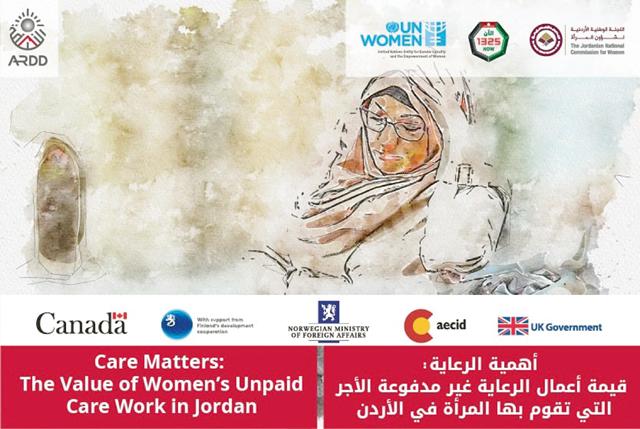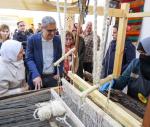You are here
Experts call for education reform to change young people’s negative views of working mothers
By Suzanna Goussous - Feb 11,2016 - Last updated at Feb 11,2016
AMMAN — With 55 per cent out of a sample of 25,662 University of Jordan (UJ) students believing that women’s jobs impact the family negatively, and 50 per cent believing men make better politicians, experts called for using education to promote women’s economic participation.
The views expressed by the students in the recent Centre for Strategic Studies study, the experts said, are products of patriarchal social views reinforced by school curricula, calling for more efforts to counter gender stereotypes and encourage women to become more productive members of society.
In addition to reforming education to show the benefits of having women in the labour market, they called for having crèches at the workplace to serve working mothers, as many women tend to quit their job once they have children.
The unemployment rate in the Kingdom stood at 13.6 per cent during the fourth quarter of 2015, according to Department of Statistics figures, with the rate among women standing at 23 per cent, compared with 11.7 per cent among men.
“Educated women better raise children, women who have jobs are better partners,” economist Yusuf Mansur said, calling for countering the mindset that educated and working women devalue men.
“They want women to act upon their whims — [to be] persons who have no rights or character,” he told The Jordan Times in a phone interview. “What contributes to this mentality is the discrimination in the workplace and unequal pay.”
Mansur called for a “better transportation system” to ensure the safety of women commuting from home to work.
Sociologist Hussein Khozai, a professor at Balqa Applied University, said the large number of students who see a negative impact of women’s economic participation did not “come out of nowhere”.
It is the result of witnessing the experiences of their relatives especially that “most of their mothers are working women”, Khozai argued.
“Students represent the visions and journeys of their parents, the percentage is accurate and the burdens on women are heavier after marriage,” he told The Jordan Times.
But he insisted that “many professions need women, for their contribution and participation in the economy encourage the public to participate as well”.
Commenting on the study, Salma Nims, the secretary general of the Jordanian National Commission for Women, said the percentage is “sad but not shocking”.
“We are still teaching a school curriculum that doesn’t promote women’s economic participation; it doesn’t include female role models, whether they are local, regional, or even global,” Nims told The Jordan Times, adding that teachers still “hold on to the old mindset”.
“There haven’t been any efforts made to transform social attitudes towards women in Jordan; we are still limited to the stereotypical roles of women.”
Nims argued that the “students who agreed [in the survey] are not even judging out of experience; they don’t know”, stressing that children of working mothers tend to be “more independent” and “spend more quality time with them”.
To counter the stereotypes, she called for conducting a scientific study on how to improve the living condition of women and provide them with better opportunities.
“Change has to start in schools and be mainstreamed in universities. We have to educate students on the importance of gender equality.”
Professor Rula Quawas, who teaches feminism and American literature at UJ, said the study shows the mentality of the younger generation.
“I teach at the university every single day. Sadly, many of my female students believe women belong in the [house], as home-makers and good wives. It is a mindset that I deal with every day,” Quawas told The Jordan Times.
Around 66.7 per cent of UJ’s some 45,000 students are females.
To counter this mindset, Quawas said people have to encourage women to get involved and convince them that they can multitask, balancing between work and home.
“The government needs to offer women creative jobs, because, in their [women’s] heads they are convinced that the easy way out is to work from home, waiting to get married,” she said.
“No matter how long the woman has been in the job market, it is always a struggle… It’s a man club, women have to work twice as much.
They get tired.”
She said when women are given assistance at home, they can balance more between their different roles, emphasising the importance of “gender-bending”.
“We have to rewrite the narrative of dos and don’ts, to exchange roles and to convince our men that it is OK to help their partners, it’s a joint effort.”
Related Articles
AMMAN — Stereotypes about the roles of women in society hinder their economic and political participation, experts said, calling for an educ
AMMAN — The ratio of women to men’s time spent on unpaid care work in Jordan is 19 to 1, the highest within the Arab states, a local study r
Inkshedding Gender Politics: Academic Activism in Feminist TheoryRula Quawas, editorAmman: Azminah, 2017Pp.

Opinion
Feb 19, 2025
- Popular
- Rated
- Commented
Feb 18, 2025
Feb 19, 2025
Newsletter
Get top stories and blog posts emailed to you each day.

















